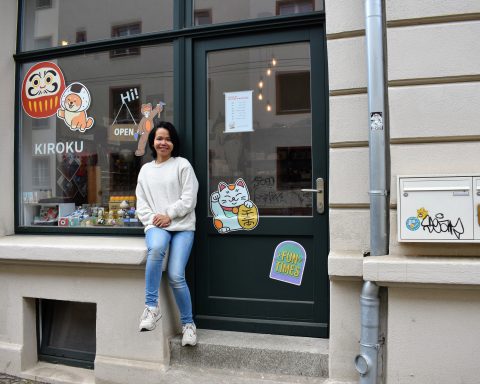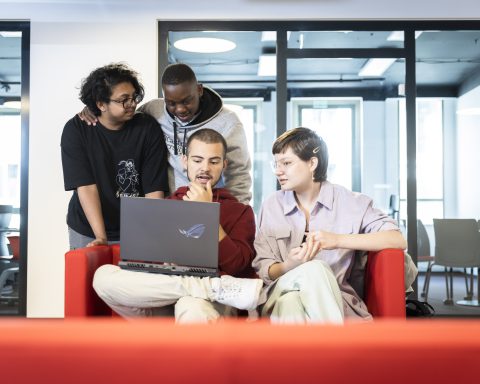Maybe you’ve been on trivago before when looking to travel somewhere, or chuckled when you spotted one of its #trivagoguy commercials. It’s a German-born hotel price comparison website that aggregates other aggregators, plus the hotels’ sites themselves, when the prices are attractive enough. What I find coolest about it is the array of options to sort the hotels (“price and popularity” being my favorite). Forbes is fond of it, too. The company is now publicly traded, and Expedia has been its majority stakeholder for some years.
But before I actually met trivago staffers, I never really wondered about the ins and outs of the company, or what it’s like to work there.
I both dislike (when experiencing) and greatly benefit (when paying) from mass tourism and its marriage of convenience to technology. With these travel-related sites, I’m usually content to simply click on the best deals, and away we go.
So to visit trivago’s office in Leipzig, on two separate occasions, was illuminating.
The invitation came from an acquaintance who told me he’d gotten a job in human resources there. I first joined him to hear a talk about Bitcoin on the premises, in a laid-back working space rather than conference room. He introduced me to some of his colleagues and showed me around. On another day, I returned to interview them.

The place looks to me like a house and feels like a startup, seemingly eschewing formal workplace hierarchies. Besides its many computers, it’s got lots of young people, beers in the break room fridge, cozy meeting corners, and cute little crafts along some its walls and halls.
Not everyone from the corporate world appreciates the ongoing seismic shift from formal to informal in dress and manner. But the 20- and 30-somethings I heard from at trivago appeared to be quite all right with their company culture.
Their office lies above Café Luise, near Leipzig city center.
There I met Daniel Tröger, trivago’s local spokesman and head engineer, who told me the company founders used to hang out at the popular café when studying at HHL. As serendipity would have it, “the three were grouped together for class projects because of their last names” – (Rolf) Schrömgens, (Stephan) Stubner and (Peter) Vinnemeier.
They launched the company in Dusseldorf in 2006. Stubner, now dean at HHL, left to become a professor and was replaced by Malte Siewert.
“With just €1.4m initial investment, trivago has grown to one of Europe’s most notable unicorns, with a circa €8bn in valuation,” says the company’s corporate page. “What was once a website only available in Germany, built by 3 guys in a garage, now operates in 55 global markets and employs over 1,600 talents.”
According to HR staff, 60 of those talents are based in Leipzig, and 33 percent come from outside of Germany. Tröger said trivago’s local office opened where it did at his suggestion, in May 2013.
This office has since been adding 13 employees per year on average, counting 22 nationalities in all. Jobs include software engineers, designers, event managers, and business intelligence professionals, besides the local-based HR team.

Drawing from his experience working for another e-commerce travel platform, Tröger was tasked with building up a third trivago office to take some of the burden off the Dusseldorf and Palma de Mallorca locations. The company would later open offices in Shanghai and Amsterdam.
He explains choosing Leipzig as trivago’s second German hub:
The city fits pretty well in the culture that is trivago. It’s getting more and more international.
Tröger and his colleagues named the city’s general open-mindedness as an advantage, as well as the students and startups now multiplying here.
At the same time, they pointed out that it’s been an issue getting the new hires to stay in Leipzig long-term.
To ease new employees’ transition locally, trivago’s HR staff helps them with relocation work, finds them kindergartens and doctors, and goes to administrative bureaus with them – amid a public service culture and bureaucracy that can be daunting even for German-speakers.
The company organizes activities for families to meet one another, and plans to collaborate with the Leipzig International School on a buddy program. In parallel to that, it tries to bring in the local community by hosting events of broader appeal at the office, such as the Leipzig Software Development Meetup. They’re constantly looking for new speakers and topics.

If they need a break from Leipzig, or anywhere else they’re based for trivago, employees have the option of working at another one of its offices in Europe for up to four weeks (including Germans’ favorite island, Mallorca). The company pays for their flights and accommodation.
It also encourages its employees to be adventurous.
Tröger spoke fondly of signing up for a program in which trivago sends staffers to an unknown destination for a little holiday, where they meet people from other company locations, have fun together, and “get rid of barriers to collaboration.” Through another program, they can propose trips to their hometown, taking their colleagues there for a few days at trivago’s expense.
They can also work from home and take vacation as they please, as long as they get the job done and their team is ok with it, Tröger added. He said staffers don’t tend to abuse it, though, because they appreciate having that freedom in the first place.
Cover shot: Wall opposite the entrance to the trivago office in Leipzig. (Photo courtesy of trivago)










